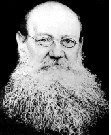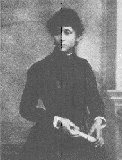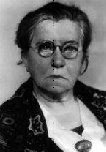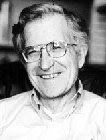Thinkers anarchists and libertarians militants

(1756-1835)
English writer and philosopher, considered the precursor of modern anarchist thought, was born on March 3, 1756 in Wisbeach from a family of dissidents Calvinists.
Following the family tradition, he studied theology and was appointed preacher in 1778, becoming pastor in several dissident communities until 1883. Influenced by the ideas of the French Revolution, especially Rousseau and Helvetius, turned away from religion, then beginning his reflection on social reality.
At that time called to a famous group of intellectuals and revolutionary workers who gathered in the taverns of London, becoming friend of Thomas Paine, author of The Rights of Man. In 1791 met in this circle, that would be his companion Mary Wollstonecraft, feminist precursor, which in 1792 published the claim on Women's Rights. This relationship was born Mary Wollstonecraft Godwin future companion of the poet Shelley and author of the novel Frankenstein.
From 1871 he began to prepare his book Research About Justice Policy, published in 1873. The book caused scandal and controversy in English society for its philosophical and revolutionary political ideas, becoming famous Godwin.
In the following years he wrote several literary works, of which the most famous is Caleb Williams (1794), which restates his ideas in literary form. Godwin is the first thinker to consider the entire state and all government is evil, and that society could exist without them being considered a precursor of the modern anarchism.
One who was a famous author, died anonymously in March 1836, when he started to develop the socialist movement that would deepen the innovative ideas that had analyzed in his work.

(1809-1865)
One that Bakunin considered the master of all anarchists, was born in France in 1809, a family of people.
Worker, typographer, self-taught, he developed his own theories of social organization based on cooperation and mutualism. In 1840 he published the book What is Property ?, which states for the first time anarchist. The book was praised by Marx, that try to attract later (1846) to a group of socialist thinkers. However, Proudhon in Marx to answer questions the creation of new dogmas, which would lead to the break with the German socialist.
At that time, 1844-1845, had meetings in Paris with Bakunin and Marx. But then in 1846 Marx wrote The Poverty of Philosophy book is a violent criticism of the book Proudhon the Philosophy of Poverty.
In 1848 Proudhon was elected to the National Assembly in Paris. In July this year pronounced a violent speech in the Assembly which exposes the opposition between proletarian and bourgeois, the object of warning by the President of Parliament.
The following year Proudhon tried to organize the People's Bank, which failed to prosper. His articles in the newspaper Representant du Peuple and Le Peuple worth him several lawsuits that force him to go into exile in Belgium.
Back in France was arrested in 1849 having stayed in prison until 1852, where he continued writing.
The edition of De la Justice dans la Révolution et dans L'Eglise, exhausted in a few days, caused new scandal and a new lawsuit that forced him into exile again in Brussels.
He returned to France where he published new books including the federate principle and The Policy Capacity of the Working Class which provided the theoretical basis of anarcho-syndicalism, arguing that the "proletariat must emancipate itself alone." He died in 1865, shortly after the founding of the First International, created largely on the initiative of the French mutualist workers.

(1814-1876)
The brightest of the theoretical and anarchist agitators, was born in Premukhino, Russia on May 11, 1814, originating from a wealthy family of the Russian nobility.
After following a military career, he left the army in 1832, when he began to oppose the tsarist government. But his connection to progressive ideas took from his reading of Hegel, friendship with the Russian revolutionary Herzen and especially from his trip to the West in 1840, when he attended the University of Berlin and the circle of the Left Hegelians in Berlin and Dresden in Germany, collaborating in the critical German magazine Annals of Arnold Ruge.
In 1843, he approached the socialist thought from contact with Moïse Hess and Proudhon, only come however to become an anarchist already in the 60s, in his European exile. During the years 1848-1849 took an active part in the riots that took place in Paris, Prague and Dresden alongside his friend Richard Wagner. Arrested after the rebellion of Dresden, was in prison from Saxony and Austria, having been handed over to the police of the Czar.
After twelve years in tsarist prisons, in 1861 he managed to escape to the West, having lived in England, Switzerland and Italy where he met Giuseppe Fanelli to collaborate with him in spreading the anarchism in Spain.
Everywhere he spent Bakunin participated in the social unrest and the foundation of revolutionary associations, becoming the best-known revolutionary of his time. The attraction that Bakunin had on the revolutionary circles led to one of the most controversial episodes of his life, the relationships maintained between 1869 and 1872 with Nechaev (1847-1882) a Russian revolutionary youth group linked to Vera Zassoulitch, described as a young fanatic, cold and cynical, which would be the author of the Revolutionary Catechism. Nechaev, not only caused many conflicts in the circles of Russian exiles, as maintained an inconsequential revolutionary activity which caused a negative impact on Russia. The Nechaev behavior and his theories that the end justifies the means, completely away from the anarchist tradition, were expressly repudiated by Bakunin from 1870.
The accession of Bakunin to the AIT in 1868 was decisive in the evolution of the discussions between the state socialism of ideas and libertarian socialism. Bakunin and Guillaume, were the main representatives of the anarchist current opposed Marx. During the Hague Congress in 1872, it was officially kicked off with anarchists from various countries of the International by the Marxists. The Nechaev behavior would be used by the Marxist group of AIT as one of the arguments to expel Bakunin in the First International.
In the last years of his life, Bakunin did not fail to follow the revolutionary movements that took place in Europe, including the revolutionary attempt in 1874 in Bologna in Italy.
His main books are God and the State; Federalism, Socialism and Antiteologismo and Statism and Anarchy.
He died on July 1, 1876, in Bern, Switzerland.nj

(1806-1856)
German thinker alias Kaspar Schmidt, born in Bavaria, Germany, in 1806, the son of a craftsman.
From 1826 to 1828 he studied in Berlin where he was a student of Hegel and Feuerbach, having directed to this university from 1832 to 1834. From 1842 he was part of the Young Hegelian radical intellectual circle that gathered around Arnold Ruge and Bruno Bauer which influenced both Marx and Bakunin. It was in meetings of that group that Engels knew.
lonely teacher, wrote The False Principle of Our Education to be published in 1842 by Marx in the journal group A Rhenish Gazette.
It would however The Ego and Its Own, published in 1884, that would become famous, making it the theory of individualist anarchism. One of the targets of criticism of Marx and Engels in The German Ideology would Stirner, that quickly, however, would eventually forgotten, been rediscovered later by Henry Mackay.
His life marked by poverty and tragedy, certainly contributed to the development of a thought that has at its center the lone individual: the one who is not subject to anything or anyone. His book earned him celebrity and scandal: imploded with conventions, moral, but also the whole social doctrine, political and philosophical of his time. Saying: "I am free not in any State" or "the whole state is despotic." However, his idea of an "I" absolute, even when linked to his conception of a association of selfish, was far from the ideas and values that are expressed in social anarchism and even later anarchist individualism. Stirner that was defined as Single, certainly was as original radical thinker, and in that sense it is difficult to classify it, even for his anti-statism and heretical spirit was a libertarian.
The thought of Stirner in the anarchist movement had a limited influence, gaining his work greater disclosure from 1888, when the anarchist poet John Henry Mackay, wrote his biography and some works where disclosed individualist anarchism. Since then his theories captivated some German libertarian circles, especially American and French individualism, very active in the late nineteenth century and the beginning of the present century.
He died forgotten and in poverty after 49 years, 25 July 1856.

(1828-1910)
This great Russian writer was born in 1828 in Iasnaia Poliana. Son of an important family linked to the Tsars, was orphaned as a child.
He entered the University of Kazan where he studied Oriental languages and right. In 1847, through inheritance became lord of vast lands in Iasnaia-Poliana.
After serving in the army in 1856, he traveled around Europe visiting various countries, then returned to his homeland to manage their land and to devote himself to literature.
In 1861, again he returned to France to visit his brother who was ill taking the opportunity to meet with Proudhon. With a personal life full of conflicts and a split personality, Tolstoi approached gradually, a pacifist and anarchist position, rejecting all forms of government and power.
In his homeland he created a distinctly libertarian school, next of Ferrer and the Modern School experience, having personally written the books used in the school.
His autobiographical texts My Confession and What's My Faith were seized but still had ample clandestine diffusion.
Persecuted and excommunicated by the Church, his last years are social engagement. The philosophical writings influenced the appearance of communities and a chain of Christian anarchism, particularly in France, Holland and USA.
He additionally held together with Kropotkin and Thoreau, a strong influence on one of the most important modern pacifists: Gandhi, who arrived to maintain correspondence. He died in 1910.

(1842-1921)
Writer, philosopher and Russian anarchist militant, born in the Russian nobility in Moscow in 1842.
After going through pagens Corps, now official, he went to Siberia where he held important geographical surveys. He hung up the army and became geographer having traveled to Siberia and Manchuria, where you can get to know the misery of people subjected to Tsarism.
In 1872, he made a trip to Belgium and Switzerland, where he came into contact with the anarchists of the Jura Federation, and is affiliated with the AIT.
Back in Russia, he started a militancy in illegal groups, which would lead to the Tsarist prisons. After a spectacular escape, went into exile in the West, having resumed his contacts with the Swiss anarchists, founding and editing in Geneva in 1879, the newspaper Le Revolte, to be arrested again in France in 1882.
Released in 1885, after a large movement of intellectuals and scientists, including Herbert Spencer, Ernest Renan and Victor Hugo, took refuge in England. Coexisted with the leading intellectuals of his time and was a collaborator of the Geographical Society. In some of his books, Kropotkin tried to seek a scientific basis for the anarchist thought. And if his research left work that still challenge the reader certainly also incurred the error of rationalism and scientific optimism typical of his time. But it was certainly as revolutionary propagandist, Kropotkin became the most translated and read all libertarian thinkers.
His books were in the library of the peasants and workers in almost every country. Words of a Disgusted, To the young people, Ethics, The State and its role in history had editions in several languages and on all continents. Your article on anarchism published in the Encyclopedia Britannic 1910 is today one of the most elaborate settings.
He returned to Russia during the Revolution of 1917. Critical of communist authoritarianism, wrote Lenin in March 1920, denouncing the authoritarian evolution that was taking place, releasing in June, an open letter to the West where workers warned of the evolution of the Soviet Revolution . On December 21, he returned to make new criticism in a letter to the communist leader. He died on February 8, 1921. His funeral was the last major public demonstration of Russian anarchism.
Among her books are The Conquest of Bread, Mutual Support, Fields, Factories and Workshops, Anarchist Ethics and The Great Revolution.

(1853-1932)
Main Italian anarchist thinker, was born in 1853 in southern Italy, the son of a wealthy family.
From a young age began in contestatárias activities which caused his arrest in 1868 and the suspension at the University of Naples, where he studied medicine in 1870.
In 1871 he joined the International Workers Association and the following year he met Bakunin on the occasion of the Saint-Imier Congress, and this relationship had a decisive influence on all his later anarchist militancy. Along with Cafiero and other militants, in 1877, prepared the movement "Levante Benevento", which became legendary in the Italian social struggle, when an anarchist group toured this southern region of Italy distributing weapons to the population and burning public archives, stating libertarian communism. Due to its libertarian militancy he has repeatedly by the arrests.
At the London Anarchist Congress 1881 proposed the creation of an International Anarchist. In 1885 he went into exile in Argentina, where with the first anarchist nucleus developed an active propaganda of anarchist ideas and published the newspaper bilingual Question Sociale. He returned to Europe in 1889 by installing up in France, where it had to go to England.
Like many other militants also Malatesta developed revolutionary activity in different countries: Egypt, France, Belgium, Argentina and Spain are among the countries where you have been.
In 1914, during the First World War it was one of the advocates internationalism against those who defended - even within anarchism - engagement with one of the warring factions.
His newspaper Umanità Nuova had a circulation of 50,000 copies and was one of the animators of the Italian anarcho-syndicalism of USI.
He died on July 22, 1932 in full advent of fascism under probation. One of the main anarchist brigades of the Italian resistance took his name.

(1853-1942)
Militant workers and American anarchist. According to her testimony was the daughter of Mexican mother and an Indian and after being orphaned at three years was taken to a Texas ranch where she was raised by an uncle. Some researchers, however, believe that Lucy was the daughter of Texas slaves.
In 1870, he met Albert Parsons, a former soldier confederal who came to make a radical republican and later anarchist militant. Forced out of Texas for his interracial marriage went to Chicago where he soon became linked to the revolutionary sectors that began to develop the trade union movement.
From 1878 Lucy collaborates in the newspaper The Socialist, from there becomes a writer and stir with a decisive role in the workers' organization in Chicago. In 1883 it was one of the founders of the International Working People's Association (IWPA), an important internationalist anarchist organization and advocate of direct action that was distinguished by defending the equality of women and blacks. Lucy beyond the military organization was a regular contributor to his paper The Alarm, which called for direct action against the rich and powerful.
Many of his articles also dealt with the issue of racism and discrimination defending the need for blacks to integrate the social struggle against capitalism.
In 1886 the IPWA was one of the organizations that triggered a general strike in defense of 8 hours of work on the first of May, which led to the events of the Haymarket Square and the famous case of the Chicago martyrs in the American justice condemned to death three known workers and anarchist militants, including Albert Parsons.
After the hanging of her husband maintained an active presence in the working class and anarchist movement, participating in 1905 the foundation of the revolutionary trade union confederation IWW and collaborated in the newspaper The Liberator. In the 30s, in the context of Nazi fascism advance, he decided to join the Communist Party.
Lucy Parsons died in the fire of his house in 1942, after half a century of intense militancy, which stood out as one of the most important women of the workers and American anarchist movement. His books and personal documents were seized arbitrarily by the police after the fire.

(1868-1940)
Russian anarchist, born in Kovno Province, June 27, 1868. In 1882 he was with his parents to St. Petersburg.
At seventeen, influenced by the Russian intellectual movement to go to the people, it became working.
He emigrated to the United States in 1886, settling in Rochester, where he accompanied the workers' struggles for 8 hours of work, which led to the hanging of the four Chicago anarchists militants on November 11, 1887. This fact and the relationship with activists like Joan Grey, J. Most and Voltarine of Cleyre led Emma Goldman to join the anarchism. He moved to New York where he began his militant activity, being arrested several times. In 1893 he served a year in prison.
famous orator, was one of the main agitators US anarchists, being the founder of important libertarian magazine Mother Earth.
Friend and companion of Alexander Berkman, fought for 14 years for its release, which did not occur in 1906.
In 1919 he was expelled along with Berkman and over two hundred revolutionaries to Russia. But he was soon forced to leave this country disagrees with the authoritarian methods of the communists. Traveling in Europe and Canada made conferences where denounced the repression that began in Russia.
With the start of the Spanish Revolution, goes to Barcelona in 1936, traveling to Spain in agitation activities and support to the revolutionary cause. In London he helped found a group of coordination of aid to Spain.
Fighting the workers' cause, advocate of women's rights and supporter of free love, Emma Goldaman left his writings scattered numerous publications around the world. His main books are Living My Life, Anarchism and Other Essays and Puritanism and Other Essays.
He died on May 14, 1940, at seventy in Toronto, Canada and was buried in Chicago with the workers militants killed in the nineteenth century.

(1869-1912)
Active militants and American anarchist agitator. Born on November 17, 1869, in Michigan.
Daughter of a freethinker of Belgian origin - his name is homage to Voltaire - was educated in a Catholic school in Canada, where he fled.
He began his social activism as a free-thinker, anarchist becoming the first sequence of the events of May 1886, in Chicago.
Friend of the anarchist thinker Dyer Lum and Emma Goldman, when it was sued by his activism in 1893, Voltairine wrote the pamphlet In Defense of Emma Goldman's Expropriation Law. In 1897 he was in France and England, meeting in London Kropotkin and the Freedom newspaper publishing group, also establishing contact with the Spanish exiles.
Collaborator of the anarchist press, especially the magazine Mother Earth, merit writer, famous lecturer, toured the US doing propaganda of libertarian ideas. Many of the translations of anarchist works published in the US in the late nineteenth century, are of his own.
After twenty-five years of militancy, Voltairine of Cleyne died at 46 years old in June 1912 in Chicago, due to an injury resulting from an attempted murder years earlier.

(1928- )
Important contemporary linguist, born in 1928 in the USA, the son of Ukrainian parents, is also one of the most lucid and critical contemporary thinkers.
Early it was related to anarcho-syndicalist Jewish circles and a child expressed his solidarity with the Spanish Revolution.
In the 60s, already famous for his research in the linguistic area, involved in the opposition movement to the Vietnam War.
Even today the most cited and known American thinker, Chomsky is marginalized by major US media. Not by chance, one of the issues that have been at the center of his research in recent decades has been the manipulative power of the media, the mainstream media television.
Keen observer of the international scene, Chomsky has been supportive and critical positions in all situations of international conflict, Vietnam, Latin America, Palestine Timor.
Libertarian, who knew the history of anarchism, Chomsky asserts itself as a supporter of the federalist tradition and self-government. He is currently director of the Department of Languages at the Massachusetts Institute of Technology (MIT).
Among his most important books are Ilusiones Necesarias: Control del Pensamiento en las democratic societies, Radical Priorities, 501: The Conquest Continues and New and Old Orders.
I upvoted You
Dear User known as @sheliaoliver1
Steemit has a BOT problem! Your Vote Counts... Maybe
https://steemit.com/steemit/@weenis/bots-steemit-s-first-community-based-decision-on-bots-your-vote-counts-to-be-or-not-to-be-details-inside